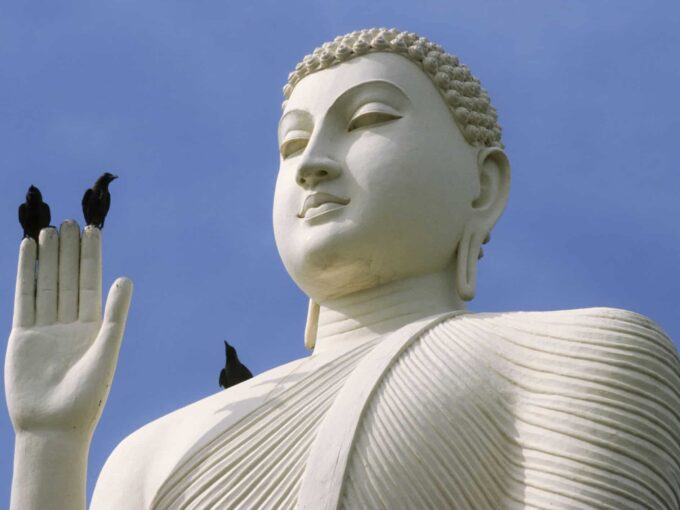”Buddhist philosophy refers to the philosophical investigations and systems of inquiry that developed among various Buddhist schools in India following the death of the Buddha and later spread throughout Asia. Buddhism‘s main concern has always been freedom from dukkha (suffering), and the path to that ultimate freedom consists in ethical action (karma), meditation and in understanding the nature of reality (prajña). Indian Buddhists sought this understanding not just from the revealed teachings of the Buddha, but through philosophical analysis and rational deliberation. Buddhist thinkers in India and subsequently in East Asia have covered topics as varied as phenomenology, ethics, ontology, epistemology, logic and philosophy of time in their analysis of this path.” (wikipedia)
In Buddhism there are some philosophical doctrines that are fundamental for all forms and schools. All the Buddhist practitioners endeavor to maintain these principles.
Momentariness: Nothing exists for any length of time. There is no substance or duration to things. Each moment is an entirely new existence, which is succeeded by an entirely new existence. The only connection between one thing and the next is that one causes the next. All the dharmas (phenomenas) are momentary. Momentariness means that there are no substances.
No-Self Nature: Nothing has a essence, nature, or character by itself. Things in isolation are shunya, “empty of self.” The nature of things only exists in relation to everything else that exists. Existence as we know it is thus completely relative and conditioned by everything else. Only Nirvana would be unconditioned, although we cannot know what it is like. No Self Nature means that there are no essences.
Shunyata, “Vacuity,” is easily misunderstood. It is not nothingness. Vacuity is neither existence, nor non-existence, nor both existence and non-existence, nor neither existence nor non-existence. This means that we don’t know what is left when we take away all conditioned relations.
No-Atman: There is no Self (atman) in Buddhism, either as an essence or as a substance. What we call our self is a collection of things, the “aggregates” (skandhas): 1) the body, or “form,” 2) feelings, 3) ideas, 4) impressions, & 5) momentary consciousness. There is no enduring thing present in the aggregates. An implication of No-Atman is that reincarnation cannot be transmigration, since there is nothing to migrate.
No-God: There is no Brahman or any other such ultimate enduring substance or nature to reality. Nirvana thus cannot be characterized as realizing either Self, Brahman, or God.
Dependent Origination: Everything has a cause. A momentary existence occurs as it does because of a previous momentary existence, but the cause itself is also momentary. Dependent Origination combines the doctrines of momentariness and relative existence. The Second Noble Truth states that desire and ignorance cause each other. This relationship can be expanded:
Ignorance (avidya), causes Impressions (samakaras), which cause Consciousness (vijnana), which causes Mind-Body (namarupa), which causes The Sense Organs (sadayatana), which cause Contact with Objects (sparsha), which cause Experience (vedana), which causes Desire (trisna), which causes Clinging (upadana), which causes the Will to be Born (bhava), which causes Rebirth (jati), which causes Suffering (jaramarana), which in turn causes Ignorance (avidya).
Nirvana means not the removal of an ultimate cause of suffering but the simultaneous removal of all causes, all of conditioned existence. The understanding of Dependent Origination (now often called “Interdependent Arising”) enables us to adjust to the world and thus live a happy and normal life. The Third Noble Truth states that Nirvana is to be attained by the removal of the causes of suffering – the entire system of causation in Dependent Origination — which means to be free of the world, not adjusted to it.
Karma: Since in Buddhism there is no substance or duration, the Buddhist view of karma is different from that in Hinduism or Jainism. From the Buddhist perspective, karma is only causation, without the mediation of any substance (apurva, causal body, etc.). Reincarnation thus consists in our being caused by something in the past, and our karma is simply the effect now of past actions.
In the history of Buddhist philosophy, these doctrines created some difficulties. If there is no self, then what is it that attains enlightenment or Nirvana? It is not me, for I am already gone in an instant; and if it is not me, then why bother? Also, if there is no enduring self, then the rewards and punishments of karma are visited on different beings than those who merited them. Why do I, instead of someone else, deserve the karma of some past existence? The important philosophical lesson of these difficulties, however, is whether the concept of causality can be used as a substitute for the concept of substance.
photo credit: cdn




